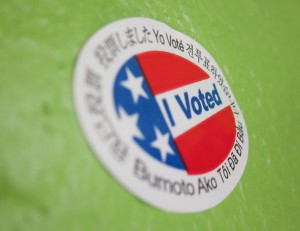It's that time again: Time for every citizen of the United States to do their civic duty. No, not jury duty! I'm talking about voting.
It's an election year and that means we'll be watching the highlights of our political process in action. On Tuesday, November 8, we'll elect a new president, one senator and members of Congress for each of our 18 districts.
It can be daunting to follow and even more daunting to understand. Luckily, resources are easy to access. Get informed, participate or start your own campaign today!
Resources
First, basic vocabulary: nonpartisan, delegate, caucus, PAC—what do all these terms mean? Scholastic has a good glossary of terms.
Find Your Polling Place
The most vital question: Where do I vote? The Chicago Board of Election Commissioners can help you find your polling place.
Uncover the Facts
If you want to follow all the news and details, try Politico.com. On the other side of the coin, if you really don't like following politics, but want the fast way to see which candidate aligns with your views, try the Vote Easy app on VoteSmart.org.
Candidates say a lot of things and make a lot of claims. If only there were a site that made it so easy to see how those claims stand up to fact checks. Well, try these fact-checking sites:
Candidates for federal office have to disclose their donations to the Federal Election Commission, which then shares that data in graphical form on its website, FEC.gov.
OpenSecrets.org, run by the Center for Responsive Politics, tracks who is giving money to candidates' campaigns.
Meet the Candidates
The Chicago Board of Election Commissioners and Illinois State Board of Elections have information on who is on your ballot for the primary and general elections.
On BallotReady.org, simply enter your ZIP code and your preferred political party, and you can get all the information for who is on the ballot.
All those judges! Check for judicial evaluations from VoteForJudges.org, which gets its data from the different bar associations.
Understand the Issues
Candidates promote themselves by sharing where they stand on issues. Being an informed voter means understanding both sides so you can support or oppose their policy proposals on these issues. A good place to read nonpartisan summaries of these is our online resource Issues & Controversies.
Or if you want to see congressional reports about the issues, the same kinds of reports that policy makers use to determine legislation, check out ProQuest Congressional.
Take Action
Tired of voting for people you just cannot support? Well, take part! The best way to begin taking action is to volunteer with either an issue or candidate campaign office. Or, once again, you can go to the Chicago Board of Elections Commissioners to:
The Illinois State Board of Elections offers the 2016 Candidates Guide.
Lastly, we have a handy guide to running a political campaign, The Campaign Manager.
Know your democracy and vote!



Add a comment to: Campaigns, Elections, Primaries, Oh My: The Election Year Post